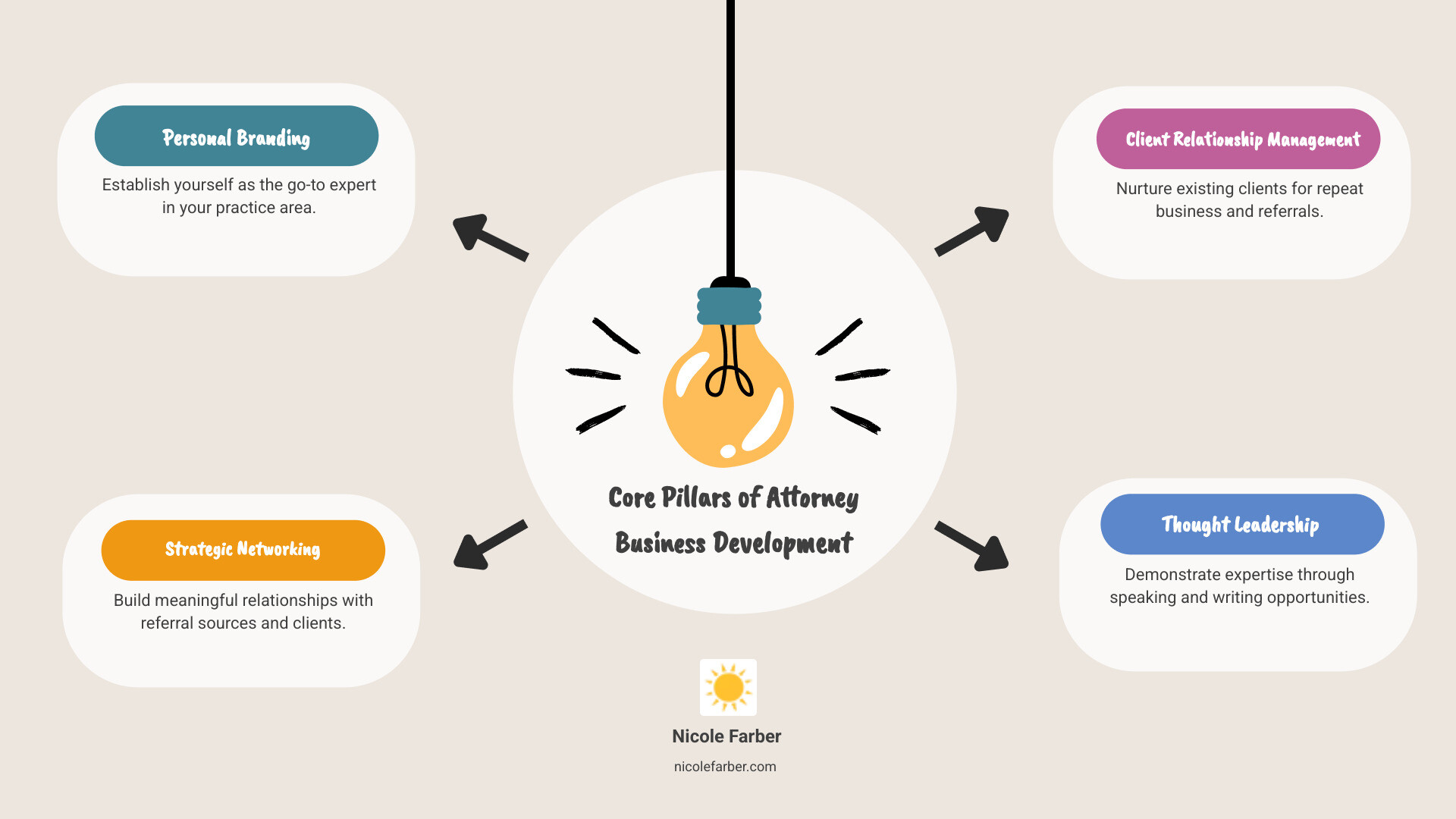Beyond Billable Hours: Essential Business Development Tips for Legal Professionals
- Entrepreneurship
- In the News
- October 10, 2025
Why Business Development is Your Secret Weapon for Legal Career Growth
Attorney business development is the strategic process of building relationships and creating sustainable revenue streams that go far beyond simply billing hours. It’s about changing from a skilled lawyer into a rainmaker who controls their own career destiny.
Core strategies include:
- Personal Branding – Establishing yourself as the go-to expert.
- Strategic Networking – Building meaningful relationships with referral sources.
- Client Relationship Management – Turning satisfied clients into repeat business.
- Thought Leadership – Demonstrating expertise through speaking and writing.
- Cross-Selling – Identifying additional ways to serve existing clients.
The numbers tell a compelling story: 57% of law firms cite business development as a major gap, while 85% of jobs are filled through networking. As one seasoned attorney noted, partners used to tell associates to just focus on the work, but today’s market demands that lawyers at every stage master business development. This reality has shifted dramatically, requiring lawyers from junior associates in Philadelphia to senior partners in Wilkes-Barre to build their practice alongside their legal expertise.
I’m Nicole Farber, CEO of ENX2 Legal Marketing. With over 15 years of experience and as a member of the ABA’s Client Development and Marketing Forum Committee, I’ve seen how the right approach transforms both individual careers and entire firms.

The Foundation: Understanding Business Development vs. Marketing
Many lawyers in Philadelphia and Wilkes-Barre use “business development” and “marketing” interchangeably, but they’re not the same. Understanding the difference can transform your approach to growth.
Think of it this way: marketing plants the seeds, while business development nurtures the garden.

Marketing creates broad awareness through ads, SEO, and social media. It casts a wide net to attract potential clients. Attorney business development, on the other hand, is the art of building genuine relationships to convert those prospects into clients and foster long-term loyalty. While marketing focuses on attraction, business development is about connection and conversion.
| Law Firm Marketing (Attracts) | Business Development (Converts & Retains) |
|---|---|
| Goal: Generate leads, create awareness | Goal: Build relationships, secure clients, foster loyalty |
| Focus: Broad audience, initial contact | Focus: Individual prospects/clients, long-term engagement |
| Timeframe: Short-term to medium-term | Timeframe: Long-term, ongoing |
| Activities: Advertising, SEO, PR, content creation | Activities: Networking, client meetings, cross-selling, referrals |
| Metric: Website traffic, lead volume | Metric: Client acquisition, retention, referral rates |
The old advice to “just do good work” is outdated. Today, even junior associates must understand business development from day one. When economic downturns hit, it’s the lawyers with strong relationships and established expertise who thrive.
Why Business Development is Crucial at Every Career Stage
Attorney business development isn’t a skill you suddenly acquire at partnership; it’s a muscle you build throughout your career.
- Junior associates should start planting seeds by building internal relationships and joining local bar associations in places like Luzerne County to grow their external network.
- Mid-level associates shift into a higher gear, attending networking events and developing a specialty niche to establish themselves as an expert.
- Senior partners and solo practitioners must continue evolving their strategies, mentoring junior lawyers while staying current with new approaches.
Treating business development like any other professional skill is the key. The 57% of firms that cite business development as a major gap represent a huge opportunity for lawyers who take this seriously to stand out.
Your Guide to Effective Attorney Business Development
Mastering attorney business development is a journey of shifting from a reactive to a proactive mindset. It’s about building a toolkit of relationship skills and strategic thinking. The beauty lies in its compound effect, where every connection and piece of content builds upon the last. Our Business Growth Strategies Ultimate Guide explores these principles, but let’s dive into the core strategies for building your practice.
Cultivating Your Personal Brand and Thought Leadership
Your personal brand is about authentically showcasing who you are. As Tom Peters notes in “What a ‘Personal Brand’ Is Not,” you already have one; the question is whether you’re actively shaping it.
Niche specialization is your secret weapon. Instead of being a generalist, become the go-to expert in a specific area, making you memorable and referrable. Build thought leadership through consistent effort. Write articles for legal publications or your firm’s blog, and seek out public speaking opportunities at bar association meetings in Philadelphia or business groups in Luzerne County. As a Marketing Speaker for Law Firms, I’ve seen how sharing expertise from the stage transforms a practice.

Also, maintain your social media presence, particularly on LinkedIn, to share insights and build your reputation.
Mastering the Art of Networking
Since 85% of jobs are filled through networking, this skill is crucial. Effective networking isn’t about collecting business cards; it’s about building genuine relationships.
Focus on relationship building by showing genuine curiosity about others. Internal networking with partners and colleagues is just as important for mentorship and internal referrals. For external networking, join local bar associations and attend community events in places like Wilkes-Barre to meet peers and potential clients.
The magic is in the follow-up. Connect on LinkedIn within 24 hours and use a “drip, drip, drip” approach to stay in touch. Every person you meet, whether at a conference in New Orleans or an event in Antigua Guatemala, represents a potential opportunity and is a cornerstone of successful Client Acquisition for Lawyers.
Fostering Client Loyalty for Repeat Business and Referrals
Landing a new client is just the beginning. Turning them into a source of repeat business and referrals is the most cost-effective way to grow.
Adopt a client-centric mindset. The fact that 21% of clients have never met their relationship partner highlights a massive opportunity. Use proactive communication, updating clients regularly and explaining matters in plain English. Exceed expectations by understanding their industry and positioning yourself as a strategic advisor.
Look for cross-selling opportunities by understanding their broader needs and your firm’s full range of services. Finally, don’t be afraid to ask for referrals and encourage online reviews. When handling referrals, always keep ethical rules like ABA Model Rule 7.2 in mind. Happy clients become your best marketing team.
Crafting Your Blueprint: A Winning Business Development Plan
Think of your attorney business development plan as a GPS for your career. Without it, you’re just hoping to stumble upon success. A simple, clear roadmap is all you need to define where you’re going and how you’ll get there.
Goal setting is the first step. Make your goals SMART: Specific, Measurable, Achievable, Relevant, and Time-bound. For example, instead of “I want more clients,” aim to “acquire 10 new corporate clients in Philadelphia within 12 months through targeted networking and thought leadership.”
Next, identify your target clients. Get crystal clear on who they are, their industries, and the challenges you can solve for them. This focus makes all your efforts more effective. Your actionable steps are the daily and weekly activities that move you toward your goals, like scheduling coffee meetings with referral sources in Luzerne County or joining a New Orleans Bar Association committee.

Timelines and accountability keep you on track, while measuring success with Key Performance Indicators (KPIs) provides hard data on your progress. Finally, a quarterly review ensures your plan stays relevant as your circumstances and markets, from Wilkes-Barre to other regions, evolve. This structured approach is foundational to the Business Leadership Strategies that transform careers.
Key Components of Your Personal Attorney Business Development Plan
Your plan needs six essential components:
- Personal Mission and Value Proposition: Your elevator pitch stating who you are, what you do, and why a client should choose you.
- Target Client Profile: A detailed picture of your ideal client, including their industry, challenges, and communication preferences.
- Key Performance Indicators (KPIs): Meaningful metrics like quality networking conversations, published articles, or converted referrals.
- Networking & Events Calendar: A proactive schedule of conferences, local bar events, and industry gatherings.
- Thought Leadership Goals: Specific targets for writing articles or securing speaking engagements to establish your expertise.
- Budget for Low-Cost Tactics: A realistic allocation for professional dues, networking coffees, and simple organizational tools.
Smart and Scrappy: Low-Cost Tactics and Tech for Modern Lawyers
The reality is that most lawyers don’t have unlimited marketing budgets. The good news? Some of the most effective attorney business development strategies cost very little beyond your time and expertise. These practical approaches work whether you’re building relationships in your local Wilkes-Barre community or staying connected with clients across different regions.
Low-Cost, High-Impact Activities
- Content Creation: Writing for legal blogs and speaking at local events (like chamber of commerce meetings) are powerful ways to showcase expertise and build authority. You can repurpose content from a single presentation into multiple blog posts or social media updates to maximize your effort.
- Community Engagement: Serving on non-profit boards allows you to give back, develop leadership skills, and meet influential people organically.
- Direct Communication: A simple email newsletter with valuable insights keeps you top-of-mind. Don’t forget to encourage satisfied clients to leave online reviews; this free social proof can generate significant leads.
- Internal Marketing: Building strong relationships within your firm can lead to valuable internal referrals and opportunities. For more online tips, explore our SEO Speaker Law Firms Tips.
Technology to Amplify Your Efforts
Technology doesn’t have to be complicated or expensive to transform your attorney business development efforts. The right tools can help you manage relationships efficiently, whether you’re working with clients locally or maintaining connections across different time zones.
- Customer Relationship Management (CRM) systems are game-changers for tracking contacts and managing follow-ups so no relationship falls through the cracks.
- Email marketing tools like Mailchimp can automate “drip campaigns” to nurture prospects and keep clients informed.
- Social media scheduling tools help you maintain a consistent, professional presence on platforms like LinkedIn without a major time investment.
- Google Alerts are a free, simple way to stay informed about your clients’ businesses, allowing you to proactively offer relevant advice.
- Case management software integration can streamline client communication and feedback requests, systematically building stronger loyalty.
These tools make geography irrelevant, helping you manage relationships effectively whether your clients are in Philadelphia, New Orleans, or anywhere else.
The Payoff and Pitfalls of Attorney Business Development
When I work with lawyers across the country – from busy Philadelphia firms to solo practitioners in Wilkes-Barre – I often hear the same question: “Is all this business development effort really worth it?” The answer is an emphatic yes, but only if you avoid the common traps that derail many well-intentioned attorneys.
Attorney business development isn’t just about bringing in new clients. It’s about fundamentally changing how you practice law and building a career that’s both fulfilling and financially rewarding.
Long-Term Benefits for You and Your Firm
Mastering attorney business development provides immense personal and professional rewards.
Building a book of business grants you career security and transforms you into a rainmaker, an indispensable asset to any firm. This gives you choices and autonomy over your career path, whether that means negotiating better terms or starting your own practice. I’ve seen attorneys in New Orleans go from anxious associates to confident partners simply because they learned to bring in business consistently.
Naturally, increased earning potential follows. You also evolve into a mentor, mentoring junior lawyers and strengthening the firm as a whole. This leadership is a key part of How to Become an Effective Leader in the legal profession. Your success creates stability and growth for the entire firm.
Common Pitfalls and Terrible Advice to Avoid
The legal profession is full of outdated thinking about business development. Avoid these common mistakes:
- The “just do good work” myth: Excellent work is the foundation, but it’s not enough to attract new business on its own. Your competitors are also doing good work.
- Transactional networking: Focus on building genuine, long-term relationships, not just collecting business cards.
- Fear of asking for business: Reframe asking for a referral as an act of service—offering to help someone else solve a problem.
- Inconsistency: Business development requires steady, ongoing effort. Sporadic activity won’t yield lasting results.
- Ignoring internal marketing: Some of your best opportunities can come from colleagues within your own firm in Luzerne County or major Philadelphia practices.
- Not having a plan: Without a clear roadmap, your efforts will lack focus and momentum.
- Ethical missteps: Always ensure your activities comply with professional conduct rules regarding advertising and referrals.
The More Tips for Effective Business Development | ABA Law Practice Today article reinforces that genuine relationship-building and consistency are key.
Conclusion
The legal profession has fundamentally changed. Attorney business development isn’t something you can put off until you make partner or until you have more time. It’s the difference between thriving and merely surviving in today’s competitive market.
Whether you’re a junior associate in Philadelphia learning the ropes, a mid-level attorney in Wilkes-Barre building your reputation, or a seasoned partner in New Orleans expanding your practice, the principles remain constant. Success comes from genuine relationship building, consistent expertise demonstration, and strategic long-term thinking.
You now have a roadmap for creating your own winning plan, leveraging cost-effective tactics, and avoiding the pitfalls that derail many well-intentioned efforts. The journey from billing hours to building a book of business requires a proactive mindset, where every conversation and client relationship is an opportunity.
This isn’t just about growing your practice – it’s about taking control of your career destiny. When you master attorney business development, you become the rainmaker who shapes your own future. The path forward starts with a single step, whether that’s joining a local bar association committee in Luzerne County or scheduling coffee with a potential referral source.
As a single mother who built a thriving business in the legal marketing industry, I understand the challenges you face. But I also know the incredible satisfaction that comes from building something meaningful and sustainable. Your legal expertise is your foundation, but attorney business development is what transforms that expertise into a thriving practice.

Ready to build your book of business? Explore our Business Coaching for Lawyers program.
